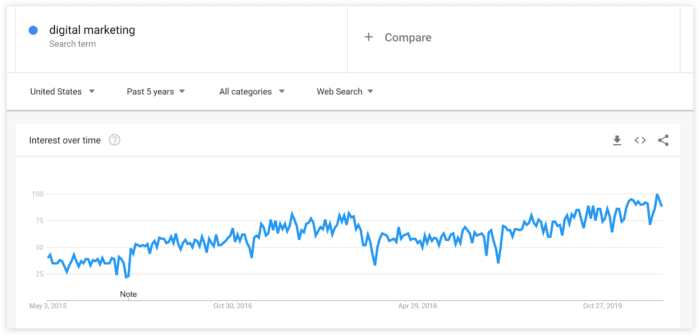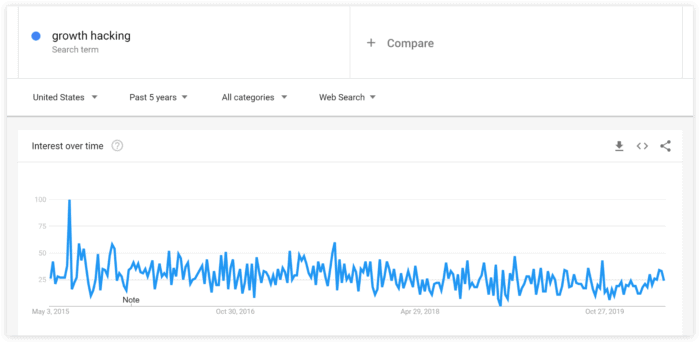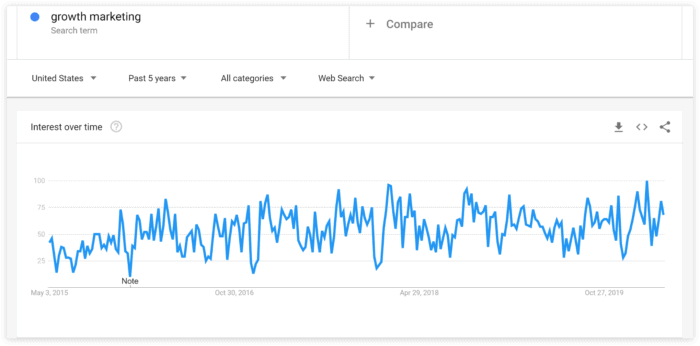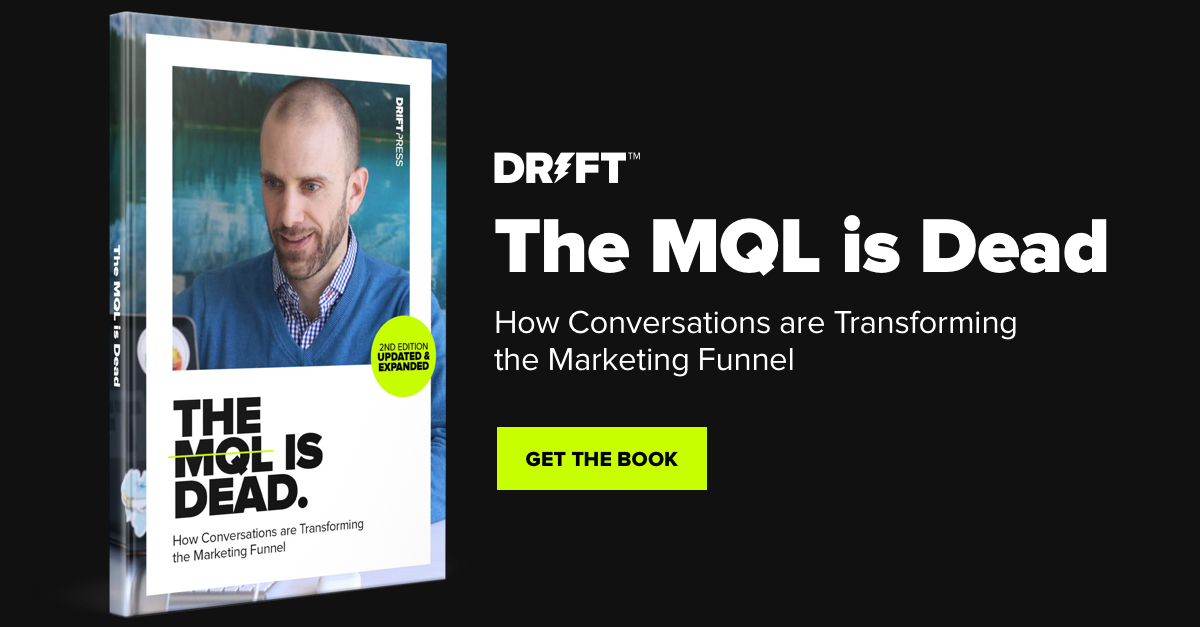As marketing changes, so do the commonly used digital marketing job titles. You’ve probably done an Indeed search and came across outdated job titles. For example, I think we can all agree that “Internet Marketer” just sounds weird 🤔
If you want to make sure the job titles you assign for open roles are up-to-date, results-oriented, and attractive to prospective candidates, then you’re in the right place. We’ve amassed dozens of digital marketing job titles that are widely used today (as well as some to avoid).
Why Digital Marketing Job Titles Aren’t an Afterthought
In a way, the roles you set for your marketing team are sort of like creating buyer personas.
You need to understand who you really want to recruit in order to pick the right job titles. Make sure the job titles you choose are what your ideal hires would want to be called.
Job titles have a huge impact beyond recruiting too. They also help people to understand their responsibilities, priorities, goals, and even what they’ll be measured on. For example, someone titled “SEO Manager” will approach their priorities differently than would a “Content Manager,” who might create content with a primary goal of storytelling rather than generating organic traffic.
Do you need to redefine roles?
Rolelessness equals lawlessness (no matter what the cool kids say). Give me clear responsibilities over ownership confusion any day.
Marketing evolves, and as it does, your roles should too. If you’re hiring, you can use the below list of digital marketing job titles to help you get clear. But first, here are some warning signs that reveal it’s time to update roles:
- Bringing on lots of new marketing hires at once
- Long term marketing employees whose titles no longer reflect how their work has changed
- Changes in company priorities, products or services, target audience, or marketing goals
How to keep titles up to date
With up-to-date job titles, you attract up-to-date talent. Hopefully, you’ve been keeping up with marketing trends enough to know what’s in and what’s out.. But if you’re unsure, you can search a phrase or idea in Google Trends to see if it’s holding steady.
According to Google Trends, usage of the term “growth marketing” has grown steadily for the past five years.

Meanwhile, “digital marketing” has experienced even more noticeable growth.
But (unsurprisingly), “growth hacking” is a trend that has fallen off the cliff.

You can also type a job title into Indeed or LinkedIn to see the kinds of companies that are using that title and check whether or not these are companies you would want to emulate. That will help you narrow down which job titles to use in listings if you’re weighing your options.
Digital Marketing Job Titles for In-House Teams
Let’s take a look at what in-house marketers are called to get some inspiration for your team. We’ve separated out our list of in-house marketing titles into four categories: senior-level, manager, implementer, and analyst.
When we asked 130 different marketing leaders across multiple industries about the top in-house marketing skill, 52% said content marketing will continue to be the most needed skill for the next 5 years. So it’s no wonder that across senior level, managerial, and entry-level jobs, we’re seeing a lot of titles that have to do with content marketing.
Senior-level job titles
- Chief Marketing Officer – C-suite level marketing executive, AKA the boss of marketing. Depending on the size of the team, the CMO might focus on strategy and measurement and less on implementation.
- VP of Marketing – Typically works in place of a CMO instead of in addition to one, but sometimes can come directly below the CMO and is more in charge of delegation and implementation, while the CMO takes on strategy and measurement.
- Director of Communications – In charge of messaging not only for marketing but press.
- Director of Brand – Similar to communications but also oversees the implementation of brand design, not just messaging.
- Director of Content – In charge of all things related to content across a variety of typically organic marketing channels.
- Creative Content Director – Similar to director of content, but leans towards storytelling and/or visual content.
- Video Creative Director – In charge of strategy and product of video content.
- Director Growth Marketing – Growth marketing leaders implement data-driven marketing that spans across channels, and this title is frequently used by startups.
- Director of Digital Marketing – Your digital marketing leader is in charge of digital strategy and delegation.
- Director of Outbound Marketing – Outbound marketers lead cold email, cold calling, direct mail, and interact closely with sales.
- Director of Direct Marketing – Direct marketing leaders have similar roles as outbound marketers, but might focus more on direct mail than email.
- Director of Inbound Marketing – Inbound marketing leaders are in charge of strategizing, implementing, and measuring content campaigns that bring in leads.
- Director of Product Marketing – Product marketing directors are essential roles at SaaS companies with freemium plans, as they need to market to product users.
- Director of Conversion Rate Optimization – At some companies, especially ecommerce, a CRO role can be director level.
Manager level job titles
In marketing, if you have a “manager” title, that could mean that you are managing people, channels, or both. For example, you could be a social media manager but not have any social media copywriters that you manage. But hey, a manager is a manager so we’re grouping all of the manager titles together.
Across channels:
- Digital Marketing Manager – Especially in smaller marketing teams, a digital marketing manager will be in charge of executing or delegating ABM, SEO, PPC, SEM, content, social, etc.
- Demand Generation Manager – Similar to a digital marketing manager, a demand generation manager will usually be in charge of SEO, PPC, SEM, and other channels.
- Growth Marketing Manager – Like the above two roles, a growth marketing manager wears a lot of hats, but is more data-driven and so probably only manages content that has SEO potential or paid promotion (not organic social).
- Marketing Operations Manager – In large marketing teams of 15+, this role is often needed to make sure projects are running smoothly.
- Brand Manager – In charge of making sure that anything the company puts out is on-brand, and might also drive key marketing strategies.
- Marketing Project Manager – As marketing teams grow, having a dedicated project manager to keep team-wide tasks on track can be a game-changer.
Channel-specific:
- Content Marketing Manager – In charge of strategizing, executing on, and delegating all forms of content, possibly including blogs, emails, social, and video.
- Social Media Manager – Creates content, manages team members or vendors, and strategically grows social accounts.
- Social Media Coordinator – Pretty much the same as above, but more likely to be used if there’s a team of other social media marketers.
- Product Marketing Manager – This person can be managed by a more senior-level product marketer or could be the only product marketer on the team.
- Paid Advertising Manager – In charge of PPC, paid search, and paid social. Might manage advertising accounts, other team members, and/or freelancers and agencies.
- Digital Advertising Manager – This is essentially the same as above, but could lean more towards paid social.
- Account-Based Marketing Manager – Someone in this role focuses on leading the ABM program and reaching out to target accounts using both digital and offline channels.
- Conversational Marketing Manager – The person in this role is in charge of managing conversational marketers and/or building and optimizing chatbot software based on strategic decisions made with sales.
- Events Marketing Manager – Someone in this role is in charge of using events as a marketing channel, and making sure the event is successful, well-attended, and profitable.
- Virtual Events Marketing Manager – Similar to above, this person runs virtual events and summits in order to attract new customers.
- Customer Marketing Manager – Someone in this role is responsible for marketing to customers and turning customers into loyal, raving fans. This might include events management, customer-centric content creation, and other innovative tactics.
- Paid Search Manager – The paid search manager typically only manages Google and Bing ads.
- SEO Manager – An SEO manager might work in coordination with a content marketing manager or in place of one, if the primary content channel is SEO blogging. This person also ranks site pages.
- Community Manager – Community managers might focus mostly on social media community management or might also manage private groups and forums.
- Partnership Manager – A partnership manager brings in partner channels to grow the business. Typically this means that the partners are larger companies.
- Affiliate Program Manager – Similar to the above, but the partner revenue is more likely to be coming from individuals, influencers, and smaller companies.
- Digital PR Manager – With a lot of crossover between marketing and PR these days, you might be looking for someone to get your company featured on podcasts, blogs, online news sites, etc.
Implementer job titles (entry-level and experienced)
These job titles can be for entry-level positions or very experienced marketing implementers. The difference between these job titles and the ones above is that people in these roles are typically not in charge of managing others.
Across channels:
- Marketing Coordinator – A marketing coordinator is a broad role that is often used in more traditional industries, where events, partnerships, and direct marketing reign.
- Digital Marketer – Especially at smaller companies, can be used to describe a savvy, jack-of-all-trades type marketer who can handle social, content, webinars, and paid ads.
- Digital Marketing Strategist – Similar to the above, but with more of a focus on decision-making and measurement.
- Ecommerce Digital Strategist – If you want someone experienced in ecommerce (or any specific industry) it could work to add that to an otherwise generic title.
- Conversion Rate Optimization Specialist – This person manages CRO on website pages, paid landing pages, and possibly ad copy too.
- Marketing Assistant – Someone in this job position can help implement everything from backlinking outreach to social media engagement to press pitches.
- Graphic Designer – Creates ad graphics, social media graphics, blog infographics, etc. Also helps manage brand consistency, particularly if there’s no Brand Manager on the team.
- Copywriter – Writes website copy, emails, ads, and possibly content like ebooks and blog posts. Might also help strategize what needs to be written, particularly if they are experienced.
- Conversion Copywriter – Typically used for copywriting work that will only be for converting traffic, not for educating, attracting, or entertaining.
- Web Designer – This person is in charge of managing your website presence and spinning up new pages as needed.
Channel-specific:
- Content Marketer – Creates a variety of forms of content such as blogs, webinars, email courses, etc.
- Content Strategist – Similar to the above but leans more towards strategic decision making and measurement than implementation.
- Social Media Marketer – Creates social media content and might also manage account growth and engagement.
- Social Media Strategist – Focuses on platform strategy, audience research, and targeting, as well as content creation.
- Conversational Marketer – Builds custom bots, optimizes websites and emails for initiating bot conversations, and collaborates with sales.
- PPC Specialist – Runs PPC ads on Facebook, Instagram, and other platforms.
- SEO Specialist – Manages non-technical and technical aspects of SEO including keyphrase research, domain authority improvement efforts, and possibly writing.
- Digital Media Buyer – Manages ads across a variety of platforms, but typically refers to PPC image and video ads. Might also include Google advertising.
- Social Video Producer – Strategizes and creates video content for social media.
- Email Marketer – Likely manages all aspects of email marketing including list growth, email content, and automation.
Marketing analytics
Marketing analytics gets its own category. Why? Well, they’re not really implementers, but they’re not really managers either. They’re analysts!
Across channels:
- Marketing Analyst – The job title for the data-driven, attribution-obsessed person who manages tracking so creative people can stop trying to.
- Marketing Performance Analyst – Same as the above but with a focus sussing out direct attribution as accurately as possible.
- Marketing Operations Analyst – Might also analyze performance, but focuses more on efficiency and execution statistics and how they affect campaign performance.
- Senior Marketing Analyst – This title can be used for more experienced analysts when more than one is employed, or when someone gets a promotion 🙌
Channel-specific:
- Direct Marketing Analyst – Only analyzes the ROI of direct channels like direct mail, email, and possibly events attendance and hosting.
- Digital Marketing Analyst – Analyzes digital channels including SEO, organic social, paid social, and others.
- Product Marketing Analyst – Looks into the efficacy of product marketing as a whole, onboarding campaigns, free trial conversion optimization efforts, etc.
- Social Media Marketing Analyst – Reviews social media results, possibly organic and paid in combination with the goal of finding what fills the pipeline
- Paid Social Marketing Analyst – Analyzes paid social media only, such as boosted Facebook posts, Instagram ads, and possibly YouTube ads or other platforms too.
Additional Digital Marketing Job Titles That Agencies Use
For sure, agencies might use some or all of the above common and popular titles. But they also have other titles that in-house teams don’t use.
Basically, put the word “account” or “services” in a title, and you’ll make it more agency-friendly. That’s because some agency marketers are in charge of managing services for clients while others are in charge of marketing those services to clients.
- Account Executive
- Account Manager
- Marketing Account Analyst
- Director of Marketing Services
- Content Account Manager
- PPC Account Manager
- SEO Account Manager
- Social Media Account Manager
- SEM Account Manager
Creative (and Controversial) Digital Marketing Job Titles
Most likely, being cutesy isn’t as important as being clear. You’re best off avoiding silly (or once-trendy) digital marketing job titles like these:
- Growth Hacker
- Brand Warrior
- Marketing Ninja
- Marketing Rockstar
Remember, the job titles you use matter. They have an effect on the talent you attract and they also help team members focus on their top priorities and take ownership over their work. Choose wisely.
Learn how CONVERSATIONS ARE TRANSFORMING THE MARKETING FUNNEL as we know it (and what you can do about it).
Editor’s Note: This article was published in September 2020 and has been updated to reflect new information.










